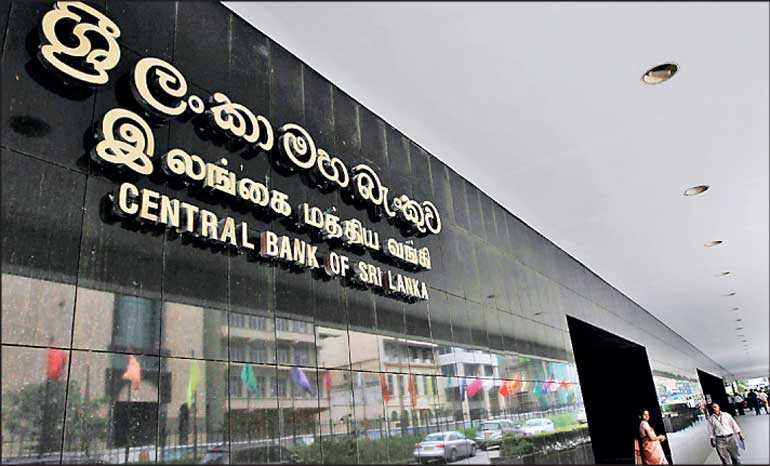Sunday Feb 15, 2026
Sunday Feb 15, 2026
Saturday, 27 June 2020 00:02 - - {{hitsCtrl.values.hits}}

Surprisingly, some of the financial institutions that have collapsed in recent times, were already under Central Bank supervision. How good is the watchdog?
 It is perhaps trite to observe that in adversity there is opportunity. The observation holds for both man as well as the collective in the form of a nation. And when hard times hit, like any typical individual, fallen nations will also attempt to rise, to go on from where they stopped. Human nature is oriented towards progress.
It is perhaps trite to observe that in adversity there is opportunity. The observation holds for both man as well as the collective in the form of a nation. And when hard times hit, like any typical individual, fallen nations will also attempt to rise, to go on from where they stopped. Human nature is oriented towards progress.
There are in recent history, good examples being Germany and Japan, of countries flattened out and utterly destroyed in World War II, rising within a short period to developed country status again (they were both advanced, industrialised nations before WW2). Countries like South Korea, Vietnam, even Singapore recovered and progressed from the effects of war, foreign occupation and degradation, rapidly. On the other hand, we have countries like Cambodia, Laos, Iran, Eritrea, and Afghanistan, having undergone harrowing conditions, are floundering, yet to record a break-through development trajectory.
Through the years, many a writer, Max Weber (1864-1920) being as early example, has pondered the question whether certain cultures, climes and character, are better equipped for the race to prosperity. Unlike in the case of an individual, it is evident that for a nation to join the ranks of the prosperous and democratic, if such an achievement is considered an ideal, certain prerequisites should be present. An encouraging culture, relative peace, discipline and the effective rule of law appear to be essential pre-conditions. Repeatedly, societies with such fundamentals in place, when given an additional fillip, in the form of encouraging government policy, have joined the ranks of the developed countries, consistently. Our record since independence, speaks for itself.
In the form of the COVID-19 virus, the entire world confronts an adversary most portentous. Up to date (11/6) about 7.5 million people worldwide have been infected, with approximately 420,000 deaths. The impact of the virus is not limited to health, potentially it can destroy entire economies, painstakingly built, bread and butter of the earth’s human inhabitants. When economies are shaken, quality of life goes down, basics become scarce, there is unrest, men are moved to desperation, and human dignity is denied.
Policy makers are aware of the danger and are scrambling to shore up their economies with various incentives. The capacity of a country to stimulate its halted economy depends of course on its individual economic strength, rich countries can do a lot more than a poor country, America’s package running into more than two trillion dollars. Nearly every country in the world has announced recovery plans for their economies. Germany anticipates a shrinkage of 6-8% of its total economy due to the effect of the COVID-19. Responding to the threat, Germany has introduced sweeping measures; a package, though smaller than USA’s massive effort, nevertheless has earned plaudits for its effectiveness.
Among the notable features of the German model are drastic tax cuts, a reduction in the VAT, bridging funding for hard-hit industries (such as hospitality, tourism and entertainment), and a one-time transfer of 300 Euros for each child. Included among the relief measures is an incentive to buy electric cars, designed to direct the country towards clean energy.
Although Sri Lanka’s potential to provide stimulus is restricted by its weak economic situation, we too have given much relief to the public. On the health front, in the battle to contain the spread of the disease, we stand among the leaders. During the lockdown period, given the challenging situation, the population was looked after reasonably well, the most disadvantaged segment of the population even receiving a token financial leg-up of Rs. 5,000 each. However, stimulating a shrunken economy is going to be, in reality, a hard, protracted effort.
Credit being the soul of business, banks are the natural bedrock on which an economy is built. A sure feature of every successful economy is a strong and well-regulated banking system. From a home-grown perspective, looking from within, our banks may appear strong and well-heeled. But relative to larger countries, they are of only minor proportion; of doubtful strength for the stormy seas of economic turmoil. And often, because of the appearance of wealth, in a cash strapped economy the banks run the risk of attracting high taxes. It is no secret that today many of our banks (as well as other financial institutions) are struggling with moratoriums on loan repayments in force, and simultaneously, a corona influenced drop in the borrowings. In other words, the banks cannot collect their debts, but must honour its depositors (creditors) and now have only a few investors wanting to borrow. To make matters worse, many of our financial institutions are also saddled with poor leadership, internal frauds, insider dealing and weak supervision. Surprisingly, some of the financial institutions that have collapsed in recent times, were already under Central Bank supervision. How good is the watchdog?
Prompted by the murder of a leader of a three-wheel drivers’ union, the Government has moved to stop the seizing of vehicle by financial institutions. The crime was committed in broad daylight in a very public place, allegedly by thugs hired by a finance company. It is no secret that in seizing vehicles of defaulters, these goons in the pay of finance companies often breach the law, exceeding the rights of an absolute owner. What we need is an acceptable and effective mechanism to seize the property (the vehicle), which in law, belongs to the finance company. However, it is hoped that this relaxation is not exploited by the lessees in general to default on their loan repayment, which would be catastrophic for an already hard-pressed banking/financial sector.
It is clear that our banks need capital infusions, and immediate measures are called for to strengthen them. The potential for the local banks to raise funds from the public is minimal, especially in a low interest regime. In some countries, the governments have resorted to quantitative easing of money supply by investing in the banks, buying bank stocks, bonds, etc. This is done in the role of a white knight, with no takeover or control agenda on the part of the Government.
For example, if the Government purchases preferred stocks in the banks at a nominal interest rate, with an option for the shares to be redeemed on a future date at a given price, the banks would get an immediate injection of funds. These funds could be then lent by the banks to their customers, the investors. The Government investment in the preferred shares would provide long term stability to the banks, while at the same time provide an interest income for the Government annually. The money received will allow the banks to lend suitably, thus resuscitating the overall economy. When the preferred shares are eventually bought back by the bank, the Government stands to earn a good return. Bank stocks have generally outperformed the market.
True, in adversity there is opportunity, but only for the brave!
Unlike in the case of an individual, it is evident that for a nation to join the ranks of the prosperous and democratic, if such an achievement is considered an ideal, certain prerequisites should be present. An encouraging culture, relative peace, discipline and the effective rule of law appear to be essential pre-conditions. Repeatedly, societies with such fundamentals in place, when given an additional fillip, in the form of encouraging government policy, have joined the ranks of the developed countries, consistently. Our record since independence, speaks for itself